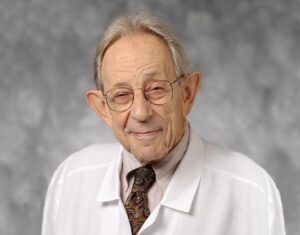A Tribute to John Balint, MD
Founder of the Alden March Bioethics Institute

In Memoriam 1925-2016
After over three decades of dedicated service to Albany Medical College as a researcher, practicing physician, administrator, and mentor, when some people might consider retirement, John Balint in the early 1990s was just beginning to redefine his career. It was during this time that I first met John at the University of Chicago, Center for Clinical Medical Ethics, when we were both members of the 1993-1994 Fellowship class. I was privileged to learn about his amazing life up to that point, but what seemed more important at that time, were his high hopes for the future.
John sought out this fellowship opportunity to prepare himself to lead the new Center for Medical Ethics which would be charged with teaching a new course that was being created in the curriculum reform process called Health, Care, and Society (HCS). To say John was excited about the new direction of his life was an understatement. As one of the leaders of this four-year longitudinal course, John was now able to focus on his deepest passion in medicine: the physician-patient relationship and the elements of good doctoring.
Of course I know now that John had been preparing for his new role from the beginning of his life. He often said his interest in the physician-patient relationship was passed along to him from his father, Michael Balint, the prominent physician-psychoanalyst and early thought leader on this topic. As a small boy growing up in Budapest, Hungary, John told me the story of joining his dad on a trip to Vienna to visit Sigmund Freud, where John played under Freud's desk while the two men talked about their patients. Though John went on to study medicine at Cambridge University in England, and then received advanced training in gastroenterology both in England and the United States, he maintained an interest in his father's work, which included The Doctor, The Patient, and His Illness originally published in 1957.
John came to Albany Medical College in 1963 to head the new division of gastroenterology and to put an indelible mark on the institution to which he dedicated most of his life. From having leading roles in NIH research grants, to serving as chair of the Department of Medicine and being an invaluable mentor and teacher to many students, residents, and fellows, John was a remarkably well-rounded physician-scientist. But most of all, as those who were around him in the clinical setting know, he was the consummate clinician—a good doctor in the mold of great doctors since Osler. One can hardly imagine better preparation, along with a fellowship in medical ethics, for leading the new program in ethics in Albany.
I was honored and excited when John asked me to join him as his new associate in the Center For Medical Ethics, Education and Research. When I joined him in 1994 our primary mission was to develop HCS throughout the four years of undergraduate training (the first year had begun in 1993-94), start a new clinical ethics consultation service for the physicians and nurses at Albany Medical Center, and become part of the lifeblood of the institution. John was never interested in purely theoretical pursuits in ethics—he wanted the new focus on ethics to make a positive difference in the lives of the students, patients and staff we served. Within a few years Liva Jacoby and Sheila Otto joined John and me, and together we were making our mission a reality. During our first decade working together I was honored to coauthor a number of papers with John including our 1996 article, Regaining the Initiative: Forging a New Model of the Patient-Physician Relation, which was published in JAMA.
John was a visionary who never stopped dreaming about new possibilities with a great deal of energy and enthusiasm. He was excited to support the joint Albany Medical College/Union Graduate College Master's of Science in Bioethics as well as the new Distinction in Bioethics for our medical students, both of which began in 2001. By the time John stepped down from the directorship, the Center for Medical Ethics had become the Alden March Bioethics Institute, which has continued to grow and flourish. But it began with John's passion to make ethics relevant in medical education and in clinical practice, and to train a new generation of young learners to become good doctors.
--Wayne Shelton, PhD, Professor, Alden March Bioethics Institute